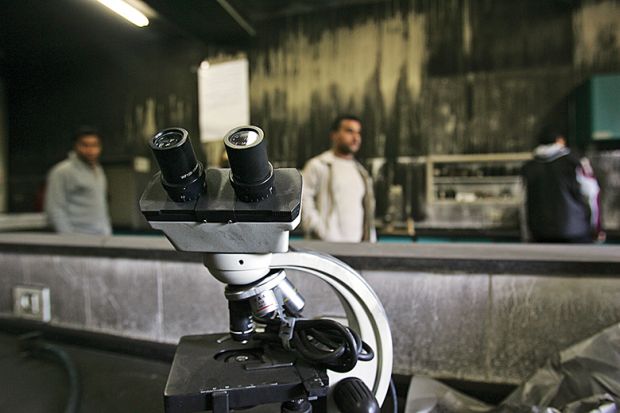“Thank you for making us feel that there are still people out there that support us.”
This was one of two responses I received to emails I sent to Gazan scholars soon after air strikes were launched by Israel following the 7 October Hamas attacks.
I knew these researchers through interviews I had conducted in 2022 for a research project on the life histories of Palestinian scholars. Most of them had received their postgraduate education from Western institutions yet had chosen to return to the open-air prison that is the Gaza Strip.
Why? Chemistry professor Dr Jamal (all names are pseudonyms) was the only Palestinian at his UK university to do so, but his reasons were clear: “I love Gaza, I love Palestine…I believed that I had to transfer the knowledge that I gained in the UK to the Palestinian people.”
But the scientific research landscape he returned to was, to say the least, fragile, lacking electricity, chemicals and journals. After the previous Israel-Palestine crisis, in May 2021, even laptops had become unavailable, recalled Dr Malek, a physicist.
This scarcity frequently obliged scholars to fund their research personally – even though most of them were underpaid because of the economic blockade on Gaza. “We haven’t received full salaries since 2015; the maximum we get is 50 per cent,” explained Dr Ahmed, an education academic.
Material constraints are common to other scholars in low- and middle-income countries, but such extreme isolation is not. The movement of all things and people into Gaza has been heavily controlled by Israel for the past 17 years. Even getting to the West Bank is fraught: all my interviewees had many times wanted to attend conferences there but were never allowed.
“Sometimes, they give you permission and then arrest you,” said Dr Jamal. “I have never been politically involved in anything; but nonetheless, I will not gamble and go to the West Bank through an Israeli checkpoint.”
Dr Yasir, another chemist, once had to turn down an invitation to a five-day Erasmus conference in Spain. “When we try to leave Gaza, we suffer from lots of issues. Especially trying to come back through Egypt…My friends who recently travelled said that they had been searched more than 10 times.”
One strategy to counter the academic isolation was to bring international faculty into Palestinian universities. However, obtaining an Israeli visa to enter the Occupied Palestinian Territories has been extremely difficult.
Some Gazan scholars were, nevertheless, able to maintain the connections they had made in the West – and even to share them with other Gazans. These connections were considered lifelines. Dr Jamal’s British PhD supervisor, now his collaborator, provided access to electronic resources, such as journal databases. And Dr Malek had heartfelt appreciation for a German collaborator who “taught me the basics of research paper writing; how to write a good title, a proper introduction, how to acknowledge sources, referencing conventions”. The collaboration resulted in 30 published papers.
Nor were Gaza scientists content to wallow in mediocrity. “I know that we are working in a dark tunnel, so, considering this, any piece of work that is produced is good,” conceded Dr Jamal. However, “If we don’t keep trying, we will die. So we have to put pressure on ourselves to keep our lives going and to build a future for our sons and daughters.”
This vision of a brighter future was what drove the scholars to continue striving under hostile conditions. Dr Malek was anxiously awaiting his promotion. Dr Ahmed planned to start an Arabic-language journal specialising in quality assurance in education. Dr Moez, an assistant professor in computer science, passionately discussed the research ideas he had put on hold until things got better: “I have a strong desire to apply AI techniques to solve water issues,” he said.
But while Gaza science was still limping determinedly along, declining interest from students was sparking fears for its future. “For some courses, we only have one or two students. Can you imagine?” Dr Yasir said. Dr Jamal worried that “in a few years, you won’t find teachers to teach physics, chemistry, maths and biology. This is a big crisis!” One solution they were trying was to offer full scholarships to visiting high school students.
Even before 7 October, the risk of Israeli air strikes was always salient. “Research requires single-mindedness, and this is disrupted when you fear for your life and those of others,” said Dr Yasir. “We have lived through four wars. All had an effect not just on our research but on our teachers, students and everyone. You could be sitting in your home while your neighbour is being bombed.”
Now, in the midst of their fifth war, the scholars’ fate is unknown, and all their efforts and dreams lie in ruins. Earlier in the war, reports confirmed that the Islamic University of Gaza and Al Azhar University – two of 28 higher education institutes in Gaza – had been bombed and a dozen university employees and 400 students had died. And we learned on Monday that the president of the Islamic University, Sufyan Tayeh, was killed as Israel resumed air strikes.
The international academic community must collectively demand a permanent ceasefire. But it will have to offer a lot more support to Gazan academics if they are to get back even to the precarious levels of productivity they enjoyed before the latest calamity.
Sheren Saad is an educational support specialist at Carnegie Mellon University in Qatar.
Register to continue
Why register?
- Registration is free and only takes a moment
- Once registered, you can read 3 articles a month
- Sign up for our newsletter
Subscribe
Or subscribe for unlimited access to:
- Unlimited access to news, views, insights & reviews
- Digital editions
- Digital access to THE’s university and college rankings analysis
Already registered or a current subscriber? Login








